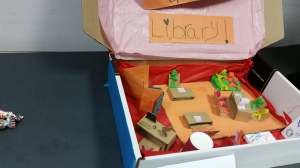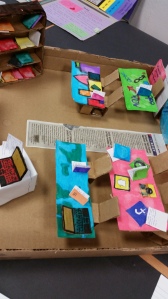Hello there, its been a while but events have still being taking place within the mentoring session as the mentees are getting used to the university life. Being on the peer mentoring course has really expanded my knowledge about the different ways individuals should be helped for them to reach their full potentials.
“Week 5, Exploring available resources in the University”
It was study week and there was no mentoring session but there was a lecture with Sandra in which she gave out some useful information on reflective written by Gibbs (1988). This is how a person is supposed to discuss his/her feelings and thoughts about a particular experience. There was also a task to explore and identify useful student services and resources available in London Metropolitan University including the study hub for the mentees to use. After personally experimenting the services provided at the University, I can highly recommend the librarian to the mentees. That lady is a valuable human resource for students, she is not only knowledgeable about library resources but approachable as well. She is the right individual for the role so I strongly advice any student with some burning issues about the course to email her for an appointment on d.adams@londonmet.ac.uk. The study hub is also a valuable resource for mentees because there are helpful tips on presentations, useful videos and information on and reading skills.
“Week 6” Group dynamics and the being a Mentor (4th/11/2015)
Today we focused on the advantages and disadvantages of group dynamics. It is very important for every mentor to be aware of situations or disputes that are bound to disrupt the mentoring session. For that particular reason, the lesson was started with us acting up various scenarios that can be expected during mentoring. It was a real eye opener for us the mentors because, even though we as a class took turns in calming down some disagreements, some problems were still unsolvable. We were all overwhelmed about how difficult some individuals can be determined about their decisions. Team work is a necessity when working in a group and without effective coordination, no objective can be achieved.
As the lecture continued on Bruce Tuckman’s stages of group dynamics which are Forming, Storming, Norming, and Adjourning. We were again put in two large groups with some scissors, A4 papers and some cello tapes to build a tower each. I’m sure that activity was to demonstrate effective team work. It was a competition to see the group who will build the tallest tower in 10 minutes. The other group quickly organised themselves and agreed on a leader in charge of instructions and a set of working style while still appreciating other members opinions. Their tower was built quickly and effectively before the end of the set time. I was in the loosing group because we had no set rules and lacked proper planning so our tower barely got off the floor. Our group stayed between the forming and storming stage because of improper organisation. The activity was a typical example of the benefits of effective collaboration and working in partnership with a set objective and determination to succeed. “A group which does not progress from the storming stage, is destined to fail by all means”.
After lecture, we all went to our allocated groups to meet the mentees but we were a little bit disappointed because some of them have decided to be absent. The most important thing is that mentors are still motivated about the session so we gave a one to one attention to those who were present and the mood was good. I personally helped to calm one mentee who was feeling very worried about an assignment she is suppose to submit soon. The day’s lecture about group dynamics was demonstrated during the session when one of the mentees just kept to herself and shes been like that for a while because, as far as she is concerned, there is nothing she need from the mentors because, she thinks she know everything about the course and the university. As one of my colleague approached her for a chat, she still showed how confident she was but as the conversation progressed, she realised that there were many things she didn’t know so she ended up appreciating the conversation the mentor started with her and she thanked her. That just shows how difficult some mentees can be, but with the right professional approach, they can drop the attitude and get on with their peers and the mentors. Learning is a continuous process and no one is never too young or old to learn from others. I am very grateful for the help I am getting from my lecturers and colleagues alike.
Till then, I wish you all a great weekend.





